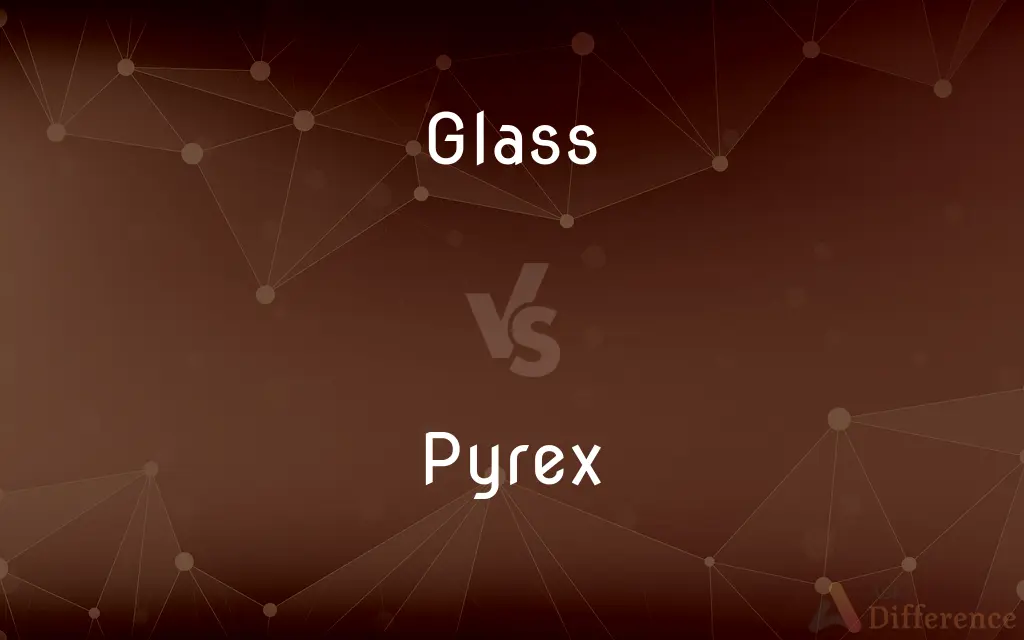Glass vs. Pyrex — What's the Difference?
By Maham Liaqat & Urooj Arif — Updated on April 15, 2024
Glass is a versatile, transparent material made from silica, while Pyrex, a brand name, specifically refers to a type of heat-resistant borosilicate glass.

Difference Between Glass and Pyrex
Table of Contents
ADVERTISEMENT
Key Differences
Glass is typically made from a mixture of silica, soda, and lime, creating a clear, brittle material. Pyrex, on the other hand, is a specific type of glass made from borosilicate, which includes boric oxide, making it resistant to thermal shock.
Regular glass tends to crack under rapid temperature changes due to thermal shock. Pyrex, however, is engineered to withstand high variations in temperature, making it ideal for use in cooking and laboratory environments.
Glass is a general term for a wide range of silicate glasses, including window glass and glassware. Pyrex is a brand that became synonymous with borosilicate glassware, often used in kitchens and labs.
Most glass types provide excellent optical clarity and are used in windows, bottles, and eyewear. Pyrex, while also clear, prioritizes thermal resistance over optical perfection, which can sometimes lead to slight distortions.
Standard glass is prevalent in everyday objects like drinking glasses and windows. Pyrex is specifically sought after for applications requiring sudden temperature changes, such as baking dishes and laboratory equipment.
ADVERTISEMENT
Comparison Chart
Composition
Silica, soda, lime
Borosilicate, includes boric oxide
Thermal Resistance
Low, can shatter when heated or cooled quickly
High, designed to handle sudden temperature changes
Typical Uses
Windows, bottles, decorations
Baking dishes, laboratory glassware
Transparency
High optical clarity
Generally clear, but less focused on optical properties
Brand Status
Generic material
Specific brand known for borosilicate products
Compare with Definitions
Glass
Transparent, hard material made primarily of silica.
The artist molded the molten glass into a beautiful vase.
Pyrex
Not as resistant to impact as some other glass types.
The Pyrex dish broke when it was dropped on the tile floor.
Glass
Breakable and brittle under stress.
The glass shattered into pieces when it hit the floor.
Pyrex
A brand of borosilicate glass known for its heat resistance.
She baked the lasagna in her Pyrex dish.
Glass
Can be recycled repeatedly without loss in quality.
Recycled glass is often used to produce new bottles.
Pyrex
Often used in kitchenware and laboratory equipment.
The laboratory stocked Pyrex beakers for chemical experiments.
Glass
Various types include float, tempered, and stained glass.
Stained glass windows are popular in historical and religious buildings.
Pyrex
Resistant to thermal shock, making it safe for high-temperature cooking.
Pyrex dishes can go from freezer to oven without cracking.
Glass
Used in making windows, bottles, and art.
The glass windows were cleaned to a sparkling finish.
Pyrex
Produced by Corning Inc. but now owned by other companies globally.
Pyrex remains a popular choice for durable kitchenware.
Glass
Glass is a non-crystalline, often transparent amorphous solid, that has widespread practical, technological, and decorative use in, for example, window panes, tableware, and optics. Glass is most often formed by rapid cooling (quenching) of the molten form; some glasses such as volcanic glass are naturally occurring.
Pyrex
Pyrex (trademarked as PYREX and pyrex) is a brand introduced by Corning Inc. in 1915 for a line of clear, low-thermal-expansion borosilicate glass used for laboratory glassware and kitchenware.
Glass
A hard, brittle substance, typically transparent or translucent, made by fusing sand with soda and lime and cooling rapidly. It is used to make windows, drinking containers, and other articles
The screen is made from glass
A glass door
Pyrex
A kind of heat-resistant borosilicate glass, made by mixing a high concentration of boron oxides into the molten glass to reduce its thermal expansion coefficient.
Glass
A drinking container made from glass
A beer glass
Pyrex
(by extension) Any borosilicate glass
Glass
A lens, or an optical instrument containing a lens or lenses, in particular a monocle or a magnifying lens.
Pyrex
(by extension) Any glass capable of withstanding high temperatures, such as tempered glass suitable for cooking
Glass
A mirror
She couldn't wait to put the dress on and look in the glass
Pyrex
A borosilicate glass with a low coefficient of expansion; used for heat-resistant glassware in cooking and chemistry
Glass
Cover or enclose with glass
The inn has a long gallery, now glassed in
Glass
(especially in hunting) scan (one's surroundings) with binoculars
The first day was spent glassing the rolling hills
Glass
Hit (someone) in the face with a beer glass
He glassed the landlord because he'd been chatting to Jo
Glass
Reflect as if in a mirror
The opposite slopes glassed themselves in the deep dark water
Glass
Any of a large class of materials with highly variable mechanical and optical properties that solidify from the molten state without crystallization, are typically made by silicates fusing with boric oxide, aluminum oxide, or phosphorus pentoxide, are generally hard, brittle, and transparent or translucent, and are considered to be supercooled liquids rather than true solids.
Glass
A drinking vessel.
Glass
A mirror.
Glass
A barometer.
Glass
A window or windowpane.
Glass
The series of transparent plastic sheets that are secured vertically above the boards in many ice rinks.
Glass
Glasses A pair of lenses mounted in a light frame, used to correct faulty vision or protect the eyes.
Glass
Often glasses A binocular or field glass.
Glass
A device, such as a monocle or spyglass, containing a lens or lenses and used as an aid to vision.
Glass
The quantity contained by a drinking vessel; a glassful.
Glass
Objects made of glass; glassware.
Glass
Made or consisting of glass.
Glass
Fitted with panes of glass; glazed.
Glass
To enclose or encase with glass.
Glass
To put into a glass container.
Glass
To provide with glass or glass parts.
Glass
To make glassy; glaze.
Glass
To see reflected, as in a mirror.
Glass
To reflect.
Glass
To scan (a tract of land or forest, for example) with an optical instrument.
Glass
To become glassy.
Glass
To use an optical instrument, as in looking for game.
Glass
An amorphous solid, often transparent substance, usually made by melting silica sand with various additives (for most purposes, a mixture of soda, potash and lime is added).
The tabletop is made of glass.
A popular myth is that window glass is actually an extremely viscous liquid.
Glass
Any amorphous solid (one without a regular crystal lattice).
Metal glasses, unlike those based on silica, are electrically conductive, which can be either an advantage or a disadvantage, depending on the application.
Glass
(countable) A vessel from which one drinks, especially one made of glass, plastic, or similar translucent or semi-translucent material.
Fill my glass with milk, please.
Glass
(metonymically) The quantity of liquid contained in such a vessel.
There is half a glass of milk in each pound of chocolate we produce.
Glass
(uncountable) Glassware.
We collected art glass.
Glass
A mirror.
She adjusted her lipstick in the glass.
Glass
A magnifying glass or telescope.
Glass
(sport) A barrier made of solid, transparent material.
Glass
The backboard.
He caught the rebound off the glass.
Glass
(ice hockey) The clear, protective screen surrounding a hockey rink.
He fired the outlet pass off the glass.
Glass
A barometer.
Glass
Transparent or translucent.
Glass frog;
Glass shrimp;
Glass worm
Glass
(obsolete) An hourglass.
Glass
Lenses, considered collectively.
Her new camera was incompatible with her old one, so she needed to buy new glass.
Glass
A pane of glass; a window (especially of a coach or similar vehicle).
Glass
(transitive) To fit with glass; to glaze.
Glass
(transitive) To enclose in glass.
Glass
(transitive) fibreglass To fit, cover, fill, or build, with fibreglass-reinforced resin composite (fiberglass).
Glass
To strike (someone), particularly in the face, with a drinking glass with the intent of causing injury.
Glass
To bombard an area with such intensity (nuclear bomb, fusion bomb, etc) as to melt the landscape into glass.
Glass
(transitive) To view through an optical instrument such as binoculars.
Glass
(transitive) To smooth or polish (leather, etc.), by rubbing it with a glass burnisher.
Glass
To reflect; to mirror.
Glass
(transitive) To make glassy.
Glass
(intransitive) To become glassy.
Glass
A hard, brittle, translucent, and commonly transparent substance, white or colored, having a conchoidal fracture, and made by fusing together sand or silica with lime, potash, soda, or lead oxide. It is used for window panes and mirrors, for articles of table and culinary use, for lenses, and various articles of ornament.
Glass
Any substance having a peculiar glassy appearance, and a conchoidal fracture, and usually produced by fusion.
Glass
Anything made of glass.
She would not liveThe running of one glass.
Glass
A drinking vessel; a tumbler; a goblet; hence, the contents of such a vessel; especially; spirituous liquors; as, he took a glass at dinner.
Glass coaches are [allowed in English parks from which ordinary hacks are excluded], meaning by this term, which is never used in America, hired carriages that do not go on stands.
Glass
To reflect, as in a mirror; to mirror; - used reflexively.
Happy to glass themselves in such a mirror.
Where the Almighty's form glasses itself in tempests.
Glass
To case in glass.
Glass
To cover or furnish with glass; to glaze.
Glass
To smooth or polish anything, as leater, by rubbing it with a glass burnisher.
Glass
A brittle transparent solid with irregular atomic structure
Glass
A glass container for holding liquids while drinking
Glass
The quantity a glass will hold
Glass
A small refracting telescope
Glass
Amphetamine used in the form of a crystalline hydrochloride; used as a stimulant to the nervous system and as an appetite suppressant
Glass
A mirror; usually a ladies' dressing mirror
Glass
Glassware collectively;
She collected old glass
Glass
Furnish with glass;
Glass the windows
Glass
Scan (game in the forest) with binoculars
Glass
Enclose with glass;
Glass in a porch
Glass
Put in a glass container
Glass
Become glassy or take on a glass-like appearance;
Her eyes glaze over when she is bored
Common Curiosities
Why does Pyrex not shatter under high heat?
Pyrex is made from borosilicate glass, which expands less than regular glass under heat, reducing stress and the likelihood of shattering.
How does the cost of Pyrex compare to regular glass?
Pyrex tends to be more expensive than regular glass due to its specialized manufacturing process and thermal resistance properties.
Is all Pyrex glassware?
Traditionally, yes, though the brand now also includes some metal cookware items.
Can glass and Pyrex be recycled in the same way?
Yes, both can be recycled, although it is recommended to check if your local recycling program accepts Pyrex as its composition differs from regular glass.
What is the main difference between glass and Pyrex?
Glass refers to a broad group of silica-based materials, while Pyrex is a brand of borosilicate glass known for its resistance to thermal shock.
Can Pyrex be used at any oven temperature?
Pyrex can be used in ovens at recommended temperatures, typically up to 425°F (218°C), but it should not be exposed to broiler heat.
Can regular glass be made to be as resistant as Pyrex?
Regular glass can be chemically or thermally tempered to increase its strength and thermal shock resistance, but it will not match the specific properties of borosilicate glass.
Can I put Pyrex on a stovetop?
It is not recommended to use Pyrex on a direct heat source like a stovetop as it can lead to thermal stress and potential breakage.
What are the environmental impacts of using glass vs. Pyrex?
Both materials are environmentally friendly as they are non-toxic and recyclable, but the production of borosilicate glass (Pyrex) generally requires more energy due to its specialized composition.
Is Pyrex microwave safe?
Yes, Pyrex is designed to be microwave safe, making it versatile for cooking and reheating food.
Why is Pyrex often preferred for laboratory glassware?
Its ability to withstand sudden temperature changes and chemical resistance makes Pyrex ideal for the demanding conditions of laboratory experiments.
Are there health risks associated with using old glass or Pyrex dishes?
There are no specific health risks associated with the age of glass or Pyrex dishes, but it's essential to replace any item that shows signs of deep scratches, chips, or cracks.
How are Pyrex and glass made differently?
Pyrex is made using a blend that includes boron oxide, which changes its heat resistance and thermal properties, unlike regular glass which mainly consists of silica sand melted at high temperatures.
Does the clarity of glass affect its properties?
While clarity is mostly an aesthetic feature, it does not significantly affect the physical properties of the glass but can influence its application, such as in optical lenses.
What should I do if my Pyrex or glass breaks?
Carefully collect and dispose of the pieces, ideally in a container that prevents the broken glass from causing harm. Consult local recycling guidelines for disposal.
Share Your Discovery

Previous Comparison
Chiropractor vs. Doctor
Next Comparison
Report vs. NoticeAuthor Spotlight
Written by
Maham LiaqatCo-written by
Urooj ArifUrooj is a skilled content writer at Ask Difference, known for her exceptional ability to simplify complex topics into engaging and informative content. With a passion for research and a flair for clear, concise writing, she consistently delivers articles that resonate with our diverse audience.














































